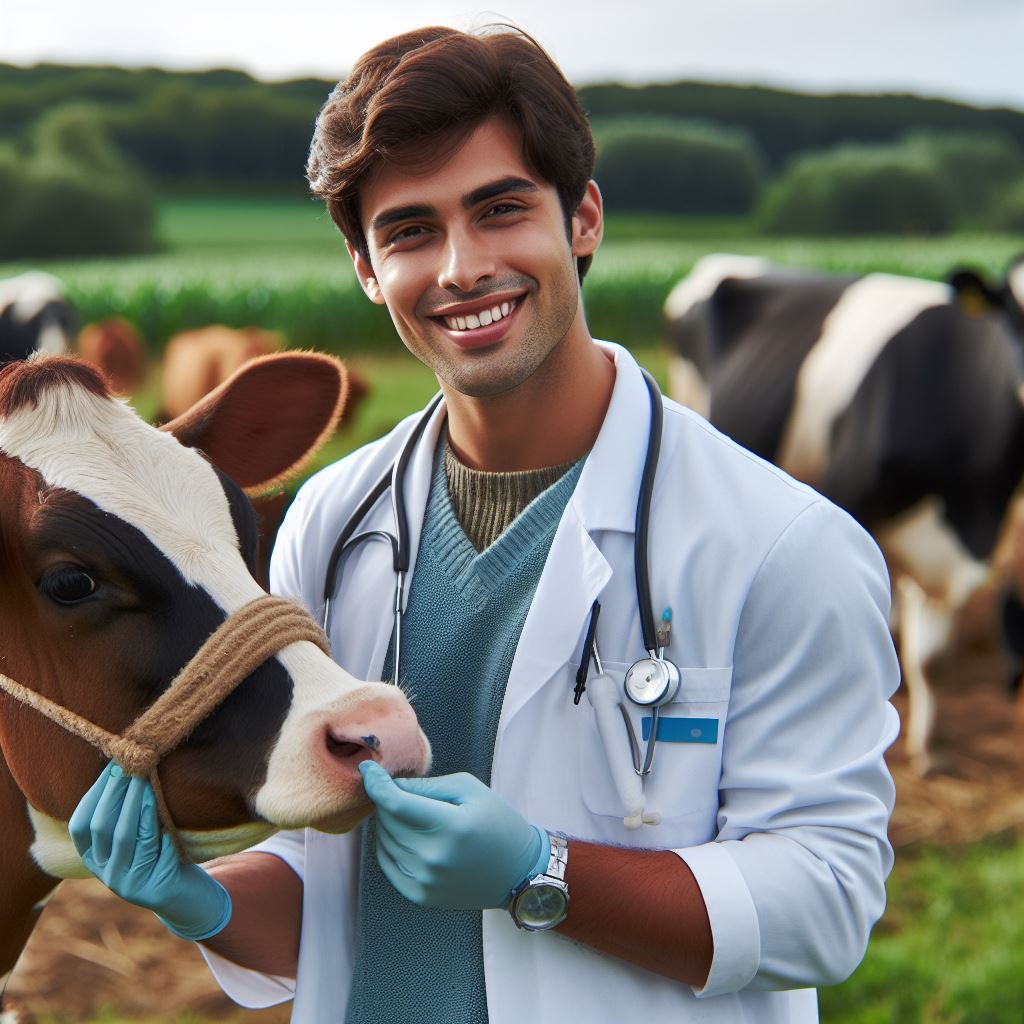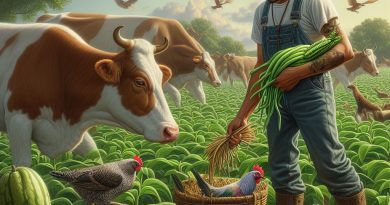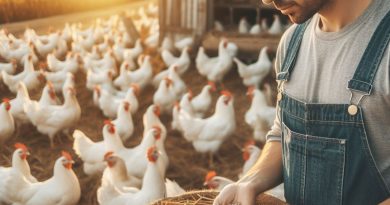Livestock Health: Pasture-Based Tips
Last Updated on January 27, 2024
Introduction
Livestock Health is the cornerstone of a successful farm, influencing productivity and overall sustainability.
Ensuring the well-being of your animals goes beyond mere care—it’s an investment in the future of your farming endeavors.
Transitioning into the Focus of Pasture-Based Tips, we recognize that pastures play a pivotal role in maintaining and enhancing livestock health.
The quality of grazing directly impacts the nutritional intake of animals, affecting their growth, reproduction, and resistance to diseases.
Pasture-based tips offer a holistic approach, capitalizing on natural resources to optimize the health of your livestock.
Well-managed pastures provide not just sustenance but a foundation for vitality and longevity in your herd.
Throughout this section, we will explore actionable and effective tips that leverage the benefits of pastures, ensuring that your livestock not only thrives but contributes to a resilient and flourishing farming ecosystem.
From rotational grazing to strategic forage planning, these pasture-based insights aim to empower you in fostering optimal health for your livestock.
Understanding the Basics of Pasture-Based Livestock Health
Definition of pasture-based livestock health
- Pasture-based livestock health refers to the well-being of animals raised primarily on pastures.
- These systems prioritize grazing on natural forages, allowing animals to exhibit their natural behaviors.
- Livestock in these systems are less confined and have more access to open spaces.
- They rely on the natural healing properties of fresh air, sunlight, and exercise.
Benefits of pasture-based systems
- Pasture-based systems promote animal welfare by providing a more natural living environment.
- Livestock have the freedom to roam, graze, and socialize, leading to less stress and better mental health.
- Animals in pasture-based systems develop stronger immune systems by being exposed to diverse plants and microorganisms.
- These systems reduce the need for antibiotics and other medications as livestock naturally build disease resistance.
- Environmentally, pasture-based systems promote soil health, biodiversity, and carbon sequestration.
Importance of balancing nutrition and forage quality
- Proper nutrition is essential for maintaining the health and productivity of livestock in pasture-based systems.
- Forage quality directly impacts the nutritional value of the diet and the animal’s overall well-being.
- Livestock require a balanced diet of carbohydrates, proteins, fats, vitamins, minerals, and water.
- Pasture management plays a crucial role in maintaining optimal forage quality and nutrient availability.
- Analyze and monitor forage quality regularly to ensure it meets the nutritional requirements of the livestock.
- Supplement the diet with additional nutrients if deficiencies are identified through forage analysis.
- Implement rotational grazing to prevent overgrazing and promote regrowth of pasture forages.
- Monitor the body condition of livestock to ensure they are receiving adequate nutrition.
- Provide access to clean water sources to avoid dehydration and promote proper digestion.
- Work with veterinarians and nutritionists to develop a balanced feeding program for pasture-based livestock.
In essence, understanding the basics of pasture-based livestock health is crucial for successful animal management.
Pasture-based systems prioritize the well-being of livestock by providing natural living conditions and promoting animal welfare.
These systems offer numerous benefits, ranging from better mental health to reduced reliance on medications.
Balancing nutrition and forage quality is vital for maintaining the optimal health and productivity of livestock in these systems.
Regular forage analysis and proper grazing management are necessary to ensure livestock receive essential nutrients.
By adopting pasture-based practices, farmers can enhance the health and well-being of their animals while promoting environmental sustainability.
Read: Essential Equipment for Modern Pig Farms
Creating Proper Grazing Management Plans
The Significance of Rotational Grazing
- Rotational grazing involves dividing pastures into smaller sections to control livestock grazing.
- This method allows pastures to rest and regrow, preventing overgrazing and promoting healthier vegetation.
- It improves livestock nutrition by offering them a fresh and diverse range of pasture plants.
- Rotational grazing also reduces the risk of disease transmission within the herd by minimizing close contact.
- Implementing a rotational grazing system has long-term benefits for soil health and overall pasture productivity.
The Concept of Stocking Rates
- Stocking rates refer to the number of animals allowed per unit of land to maintain healthy pastures.
- Properly managing stocking rates is crucial to prevent overgrazing and environmental degradation.
- It is essential to ensure sufficient forage availability to meet the nutritional needs of livestock.
- By carefully monitoring stocking rates, farmers can prevent soil erosion, weed infestation, and nutrient depletion.
- Regularly adjusting stocking rates based on pasture condition and forage growth is necessary to maintain optimal livestock health.
Importance of Proper Fencing and Pasture Layout
- Effective fencing is vital for controlling livestock movement and ensuring proper grazing management.
- Well-planned pasture layouts help facilitate rotational grazing and provide easy access to water sources.
- Fencing should be sturdy and secure, preventing animals from escaping and predators from entering.
- Regular maintenance and repair of fences are necessary to prevent accidents and maintain herd health.
- A well-designed pasture layout minimizes walking distances for animals, optimizing their grazing efficiency.
Proper grazing management is essential for livestock health and pasture productivity.
Implementing rotational grazing helps maintain healthier pastures by allowing them to rest and regenerate.
It also improves nutrition for livestock, reduces the risk of diseases, and supports long-term soil health.
Careful consideration of stocking rates ensures sufficient forage availability while preventing overgrazing and environmental degradation.
Regular monitoring and adjustments based on pasture conditions are necessary.
Additionally, investing in proper fencing and well-planned pasture layouts contribute to effective grazing management.
Sturdy and secure fences help control livestock movement and prevent escapes, while pasture layouts facilitate rotational grazing and easy access to water sources.
Regular maintenance and repair of fences are crucial for ensuring herd safety.
Moreover, a well-designed layout optimizes grazing efficiency by minimizing walking distances for animals.
By implementing these grazing management practices, farmers can promote livestock health, improve pasture quality, and sustainably manage their agricultural operations.
Read: AI in Livestock Farming: Opportunities & Risks

Ensuring Proper Nutrition for Livestock
The role of forage and grass species in livestock nutrition
- Forage and grass species play a crucial role in providing essential nutrients for livestock.
- They are a primary source of energy, protein, vitamins, and minerals in their natural diet.
- Different grass species have varying levels of nutrition, so it’s important to understand their nutritional profiles.
- Livestock should have access to a diverse range of forage and grass species for a well-balanced diet.
- Proper pasture management ensures healthy grass growth, benefiting the livestock’s nutrition and overall health.
Importance of proper supplementation
- Despite consuming forage and grass, livestock may still require additional nutrients through supplementation.
- Supplementation fills any nutritional gaps and ensures optimal growth, reproduction, and overall health.
- Factors like age, weight, breed, stage of production, and environmental conditions influence the supplementation needs.
- Consultation with a veterinarian or livestock nutritionist helps determine the right supplementation plan.
- Proper supplementation prevents deficiencies and boosts the livestock’s immune system, minimizing the risk of diseases.
Significance of providing mineral and salt blocks
- Mineral and salt blocks are crucial for meeting the specific mineral requirements of livestock.
- These blocks provide essential minerals like calcium, phosphorus, sodium, magnesium, and trace minerals.
- Proper mineral intake aids in bone development, reproduction, and overall metabolic functions of livestock.
- Salt blocks fulfill the salt requirements, maintain electrolyte balance, and enhance water intake.
- Care should be taken to provide mineral and salt blocks in clean and accessible locations for easy consumption.
Proper nutrition is essential for the overall health and productivity of livestock.
Forage and grass play a vital role in providing the necessary nutrients, including energy, protein, vitamins, and minerals.
Livestock should have access to diverse species of forage and grass to ensure a well-balanced diet.
Additionally, proper supplementation is crucial to fill any nutritional gaps and optimize growth, reproduction, and overall health.
Factors like age, weight, breed, and environmental conditions influence the specific supplementation needs.
Consulting with a veterinarian or livestock nutritionist helps determine the most appropriate supplementation plan for your livestock.
Furthermore, providing mineral and salt blocks is significant for meeting specific mineral requirements.
These blocks supply essential minerals that aid in bone development, reproduction, and metabolic functions.
Salt blocks, in particular, fulfill the salt requirements, maintain electrolyte balance, and enhance water intake.
It is important to place mineral and salt blocks in clean and accessible locations for easy consumption by the livestock.
By ensuring proper nutrition through forage, grass, supplementation, and mineral blocks, you can promote the overall health and well-being of your livestock.
Read: Innovative Wool Shearing Equipment Update
Preventing and Managing Common Livestock Health Issues
Identifying and preventing internal and external parasites
- Regularly inspect animals for signs of external parasites such as lice, ticks, and mites.
- Maintain clean and dry bedding to minimize the risk of external parasite infestations.
- Implement proper biosecurity measures to prevent the introduction of external parasites to your livestock.
- Consult with a veterinarian to develop an effective deworming program to control internal parasites.
- Monitor grazing areas for signs of contamination and practice rotational grazing to reduce parasite burdens.
Effective vaccination schedules
- Work closely with a veterinarian to develop a vaccination schedule tailored to the specific needs of your livestock.
- Ensure all animals receive core vaccinations, such as those for Clostridial diseases and respiratory infections.
- Consider additional vaccinations based on the specific diseases prevalent in your geographical area.
- Adhere to proper vaccination techniques and storage guidelines to maintain vaccine efficacy.
- Keep detailed records of vaccinations administered to each individual animal for future reference.
Strategies for preventing and treating common diseases
- Implement a strict biosecurity protocol to prevent the introduction and spread of diseases within your livestock.
- Quarantine new animals before introducing them to the rest of the herd to prevent disease transmission.
- Maintain proper nutrition and provide a balanced diet to promote a strong immune system in your livestock.
- Monitor animals closely for any signs of illness, such as decreased appetite, abnormal behavior, or changes in appearance.
- Consult with a veterinarian at the first sign of any potential disease to receive a timely diagnosis and treatment plan.
By taking a proactive approach to livestock health management, you can significantly minimize the risk of common health issues.
Regularly inspecting animals for external parasites, implementing effective vaccination schedules, and following strategies for disease prevention are key.
Remember, a healthy herd leads to increased productivity and overall well-being for your livestock.
Read: Biosecurity Tech: Safeguarding Your Livestock
Monitoring and Assessing Livestock Health
Importance of Regular Check-ups and Veterinary Care
- Regular check-ups and veterinary care are crucial for maintaining the overall health of livestock.
- These check-ups help in the early detection of any potential health issues, preventing further complications.
- Veterinary care includes vaccinations, deworming, and other preventive measures to protect livestock from diseases.
- It is important to establish a good relationship with a reliable veterinarian who can provide timely care and advice.
- Regular check-ups and veterinary care ensure that livestock remain healthy and productive, benefiting both the animals and farmers.
Signs and Symptoms of Common Livestock Health Issues
- Being able to identify signs and symptoms of common livestock health issues is essential for early intervention.
- Common signs of health issues include changes in behavior, decreased appetite, weight loss, coughing, and abnormal discharge.
- Additional symptoms may include lameness, skin lesions, swollen joints, difficulty breathing, and abnormal feces.
- It is important to observe livestock regularly and note any changes in their appearance or behavior.
- Promptly reporting any signs of illness to a veterinarian can help prevent the spread of diseases among the herd.
Techniques for Monitoring Weight and Body Condition
- Monitoring the weight and body condition of livestock is crucial for assessing their overall health and well-being.
- Regular weighing helps to ensure that livestock are properly nourished and growing at the desired rate.
- Body condition scoring is another technique used to evaluate the fat reserves and overall condition of animals.
- Assessing body condition involves observing key areas such as the ribs, spine, and tailhead for signs of fat or muscle loss.
- Monitoring weight and body condition allows farmers to adjust feeding programs and detect any potential health issues early on.
In short, monitoring and assessing livestock health are vital for maintaining the well-being of animals.
Regular check-ups and veterinary care play a significant role in preventing and managing health issues.
Recognizing signs and symptoms of common livestock health problems helps in early intervention and prevents the spread of diseases.
Monitoring weight and body condition enables farmers to adjust feeding programs and identify potential health concerns promptly.
By prioritizing the health of livestock, farmers can ensure their animals thrive and contribute to a successful farming operation.
Conclusion
Recap of Key Points Discussed
- Regular rotation of livestock on pastures helps prevent overgrazing and promotes healthier grass growth.
- Providing clean and fresh water sources is crucial for livestock health and proper digestion.
- Applying natural fertilizers and avoiding chemicals on pastures reduces the risk of health issues.
- Regular monitoring and preventive measures can help prevent the spread of parasites and diseases.
Encouragement to Implement Pasture-Based Tips for Livestock Health
By following these pasture-based tips, livestock owners can significantly improve the well-being and productivity of their animals.
Implementing these practices not only benefits the animals but also the overall sustainability of agricultural operations.
Closing Thoughts on the Importance of Livestock Well-being in Agriculture
Ensuring the health and well-being of livestock is not just an ethical responsibility but also a key factor in the success of any agricultural venture.
By prioritizing livestock health, farmers can increase productivity, reduce veterinary costs, and contribute to a more sustainable and ethical food system.


